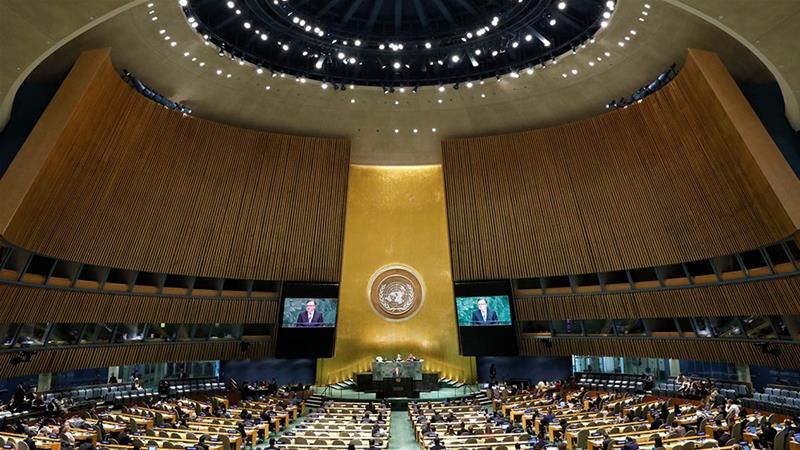UN General Assembly 2019: Speaker schedule and what to expect
Will your country’s leader take the podium on Tuesday? What should you watch for as the 74th UNGA session kicks off?
World leaders will gather at the United Nations headquarters in New York City this week for the 74th session of the UN General Assembly (UNGA).
All eyes will be on the general debate podium from September 24 to 30, when dozens of leaders will use what has been called the world’s largest diplomatic platform to highlight the issues that matter most to their countries.
This year’s UNGA comes as tensions flare in the Middle East, the UK prime minister pushes to secure a Brexit deal by the end of October, and as demands grow for governments to take greater action to combat climate change.
Here’s a look at the general debate schedule and some key things to watch for.
Tuesday’s speakers
During the general debate, leaders or country representatives are allotted 15 minutes to address the Assembly, but they are notorious for going over time.
Here’s a look at the tentative speaker schedule for Day 1. The schedule is subject to change.
Morning session
The morning session begins at 9am local time (13:00 GMT) with statements by UN Secretary-General Antonio Guterres and the UNGA President Tijjani Muhammad-Bande, followed by:
- Brazil
- United States
- Egypt
- Turkey
- Nigeria
- Maldives
- Qatar
- Switzerland
- Croatia
- Bolivia
- Jordan
- South Korea
- Burkina Faso
- France
- Chile
- Bosnia and Herzegovina
Afternoon session
The afternoon session begins at 3pm local time (19:00 GMT)
- Angola
- Portugal
- Rwanda
- Finland
- Monaco
- Niger
- Netherlands
- Argentina
- Latvia
- Slovakia
- Kazakhstan
- Poland
- Marshall Islands
- Lichtenstein
- Peru
- Senegal
- Italy
- Spain
- New Zealand
- Japan
- United Kingdom
- Morocco
Don’t see your country listed? Check back over the week as the schedules are finalised.
Key things to watch for
A US-Iran showdown
The stage is set for a US-Iran showdown this week as the leaders of both countries address the General Assembly and put forward their competing visions of security in the Middle East.
The US, Saudi Arabia, Germany, the UK and France blame Iran for this month’s attacks on Saudi oil facilities. Iran has denied responsibility for the attacks, which were claimed by Yemen’s Houthi rebels.
US President Donald Trump has already said he will discuss Iran on Tuesday when he addresses the UNGA. Iranian President Hassan Rouhani is expected to address the Assembly on Wednesday.
Although it’s unlikely the pair will meet on the sidelines, Trump has not ruled out a meeting.
“Nothing is ever off the table, completely, but I have no intention of meeting with Iran and that doesn’t mean it doesn’t happen,” Trump said. “I’m a very flexible person, but we have no intention. It’s not set up.”
Iranian officials have said a meeting is only possible if Trump is “ready to do what is necessary” by exchanging sanctions relief for “permanent monitoring of Iranian nuclear facilities”.
More climate actions
A major theme over the past week has been climate action – or inaction, according to many climate advocates. Days after millions of young people marched worldwide demanding a greater response to climate change, more than 60 leaders met on Monday for the Climate Action Summit.
Advocates will continue their protests and actions throughout the week.
The first world leader to address the UNGA will be Brazilian President Jair Bolsonaro, who has been heavily criticised for his economic and environmental policies as fires continue to burn in the Amazon. It will be his first UNGA appearance and, according to CNN, he has promised a “speech that is different from those that came before”.
Possible sideshows
Expect UK Prime Minister Boris Johnson, who is also making his UNGA debut, to meet with European leaders on the sidelines of the UNGA as they seek a breakthrough in Brexit talks.
On Monday, Johnson met European Council President Donald Tusk and no such breakthrough appeared to be on the horizon. He is expected to continue sideline meetings on the issue as Britain races towards its October 31 departure from the bloc without an exit agreement and the prospect of economic disruption. On Sunday, Johnson was delt a major blow when the UK’s Supreme Court concluded that he acted unlawfully when he suspended the country’s Parliament.
Meetings were also scheduled on Venezuela. On Monday, the US and more than a dozen Latin American countries agreed to investigate and arrest associates and senior officials of the Venezuelan government of Nicolas Maduro who are suspected of crimes including drug trafficking.
The diplomats, however, stopped short of approving military action. Expect sideline discussions to continue as countries who recognise opposition Juan Guaido as Venezuela’s legitimate leader attempt to put more pressure on Maduro, who maintains control of the country’s main state institutions.
South Korean President Moon Jae-in has been speaking to Trump on plans to restart US-North Korea talks. The pair met on Monday at the UN. Moon said he hopes working-level negotiations between US and North Korean officials will be held soon to prepare for a third summit between the countries’ leaders. Trump said, however, he would want to know what would result from a third summit with Kim Jong Un before agreeing to hold it.
Who won’t be at UNGA?
Among the world leaders not attending this year’s UNGA are embattled Israeli Prime Minister Benjamin Netanyahu, Venezuelan President Nicolas Maduro, who is seen as illegitimate by more than 50 countries – Russian President Vladimir Putin and Chinese President Xi Jinping.
Countries whose leaders will not be in attendance will send official delegations instead.
Source: Read Full Article



